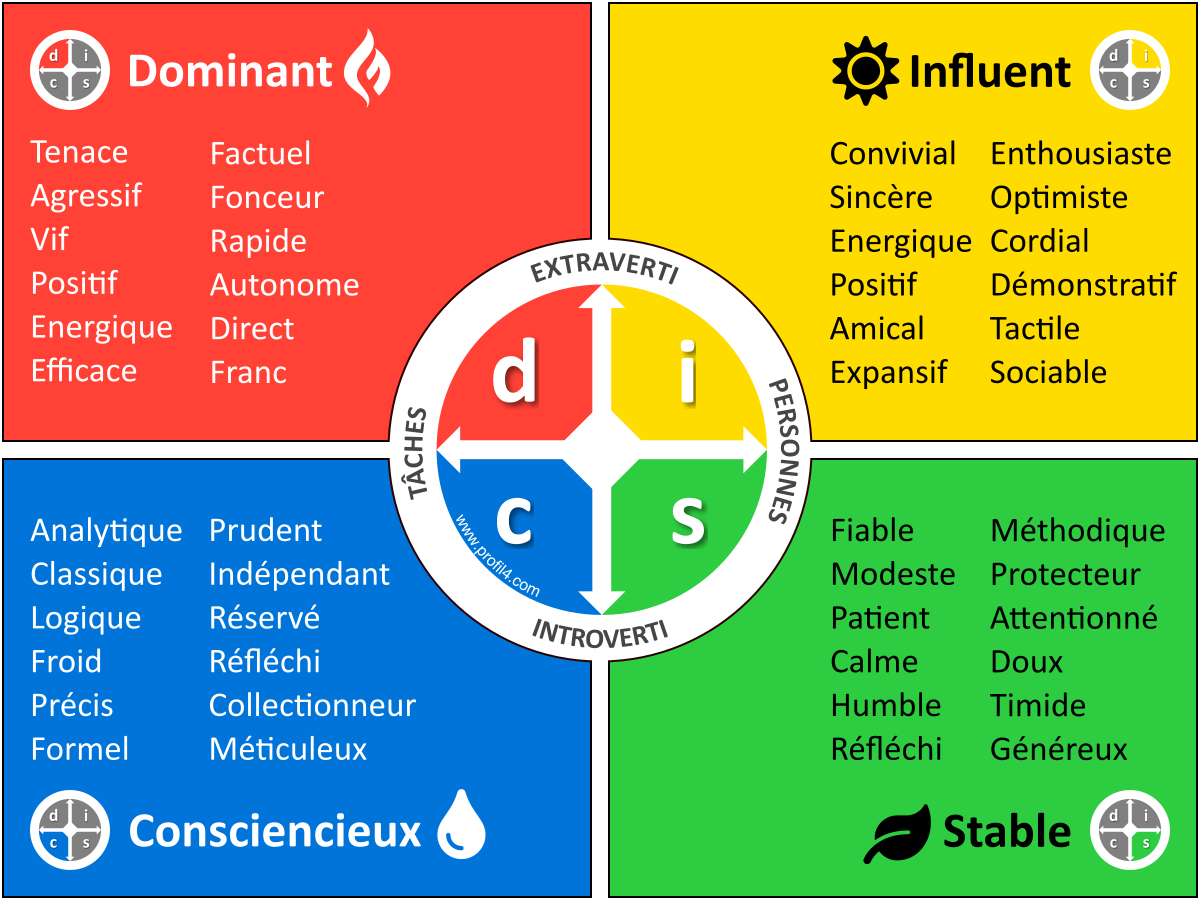Présentation du modèle DISC
The DISC color wheel
Origins of the DISC
The red profile: dominant
The yellow profile: influent
The green profile: stable
The blue profile: Conscientious
8 trends
Communication and Behavior
Motivations - ODAPHIS index
Conflict management
Stress management
Managing mistakes
Improving your sales pitch
Management
At work
Chronoplanning
Vidéos et podcasts
Further research
The DISC color wheel
Origins of the DISC
The red profile: dominant
The yellow profile: influent
The green profile: stable
The blue profile: Conscientious
8 trends
Communication and Behavior
Motivations - ODAPHIS index
Conflict management
Stress management
Managing mistakes
Improving your sales pitch
Management
At work
Chronoplanning
Vidéos et podcasts
Further research
How a person handles mistakes offers valuable insight into their personality and resilience. Understanding their approach to failure and to correcting it sheds light on their coping strategies. This plays a key role in their personal and professional development, while helping them to strengthen their relationships through the acknowledgment and appreciation of the various possible responses to mistakes. Every mistake a person makes can thus become an opportunity for growth, guiding them towards a better understanding of themself and their interaction with the world around them.
State of mind
May feel frustrated, especially if the mistake stops a goal being reached or affects efficiency.
May be impatient to correct the mistake and move on quickly.
May quickly take responsibility for the mistake and seek solutions to avoid it happening again.
May worry about how the error affects relationships with others.
May remain optimistic and see mistakes as opportunities to learn and improve.
May seek support and reassurance from others to get over the mistake.
May be concerned about how the mistake will impact the harmony and stability of the team or environment.
May feel a strong sense of guilt, especially if the mistake affects others.
May prefer a collaborative solution to fix what's wrong.
May be highly self-critical, analyzing in detail what went wrong.
May feel upset if the mistake affects the quality or accuracy of their work.
May focus on improving processes to avoid future mistakes.
Helping people get over and correct mistakes
Help them identify quick and effective solutions to correct the mistake.
Stimulate their natural tendency to take action to set things right quickly.
Recognize their ability to make decisions and solve problems effectively.
Emphasize the fact that the error does not negatively affect their relationships.
Help them see mistakes as opportunities for growth and learning.
Encourage them to use their creativity to find innovative solutions.
Show empathy and support to alleviate any worries or feelings of guilt.
Help them work with others to find a consensual solution.
Help them regain a sense of stability and balance after the mistake.
Help them analyze the mistake in detail to understand and learn from it.
Encourage improvements in processes to prevent the mistake from happening again.
Acknowledge their ability to handle the technical and detailed aspects of the problem.
What to avoid
Don't underestimate the impact or importance of the mistake, as red profiles appreciate candor.
Don't prevent them from taking initiatives to fix what's wrong.
Avoid criticizing their skills or decision-making ability in public.
Direct criticism can affect their self-confidence and morale.
Don't deprive them of social support or interaction, which are essential to their well-being.
Don't confine them to a negative view of mistakes; instead, encourage their natural optimism.
Avoid harsh or public criticism, as this can make them extremely anxious and reluctant to take initiatives in the future.
Don't rush them. They undoubtedly need time to process the information and act thoughtfully. Rushing them can lead to further mistakes and reduce their effectiveness.
Ignoring their emotions or minimizing their concerns can make them feel neglected or misunderstood.
Don't minimize the importance of details or procedures in analysing the mistake.
Avoid pressing them for a quick conclusion, as they need time to analyze and understand the mistake.
Avoid discrediting their methodology or analysis, as this may discourage them and hinder their thought process.

